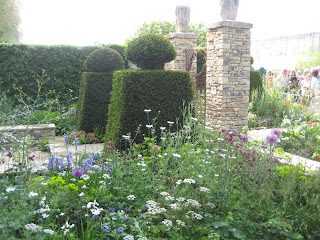Thomas Hoblyn's Garden Inspired by Italian Renaissance Garden has a strong Axial Design
Tom Swift's Had a Series of Cedar Structures with an Axis and Focal Point
Sarah Price's Garden evoked the beauty of wild areas of the British countryside and employed a long axis without a Focal Point.
Cleve West's Best of Show winning design has a strong central axis and celebrated the heritage of British gardening
View of the Focal Point of Cleve West's Garden
This Long Axis View in Andy Sturgeon's Garden without a Focal Point, looked , to me, a lot like the Price Long Axis
Arne Maynard's Garden had a Modern Focal Point (photo credit RHS)
The informal feeling planting in Cleve West's Garden
Hoblyn's low perennial planting
Sturgeon's plantings in front of the pool with distracting copper Bubble "energy wave" sculpture
Lush planting in Maynard's Garden
Price's planting in the Telegraph Garden
Diarmuid Gavin's 'Magical Garden' was a giagantic 7 level pyramid without axes but one enormous ego-satisfying focal point that could be seen from any point on the grounds at the flower show
Another garden without an axis: Jihae Hwang's garden commemorating the 60th anniversary of the Korean conflict
Chris Beardshaw's garden inspired by the Furzey Gardens did not utilize an axis in its design
I am a sucker for strong axes and focal points in garden design. I think that is why I like English gardens so much. They almost always have a very clearly articulated design which I find appealing and probably reassuring. As we walked through Hidcote, Barnsley House, Sissinghurst and the other gardens on our tour, I asked the participants to looks for axes and focal points and encouraged them to sit in every chair or bench available to discover design elements.
I decided, as we entered the 2012 Chelsea Flower Show, to compare the designs (especially if they employed axes and focal points) and the plantings of the show gardens and determine if anything ground breaking was introduced this year.
Nearly all the gold winning designs had a single axis with a focal point. Many also had cross axes perpendicular to the main axis. Most of the gardens had hedges and some sort of topiary. Interestingly, the herbaceous plantings were very similar as well. They tended to have a low naturalistic meadow feel with a mauve/pink, purple and/or purple-brown palette of planting. Few bright colors were used. This type of planting was reminiscent of many of the gardens I remember from last year's Chelsea Show.
As a whole, I thought the designs were well-executed and the plants were in excellent condition. However, I felt like many of the gardens felt very similar and the designers seemed to be playing it safe this year. Except for Diarmuid Gavin's 'Magical Garden', which I found rather odd, nothing seemed to be breaking new ground.




















































